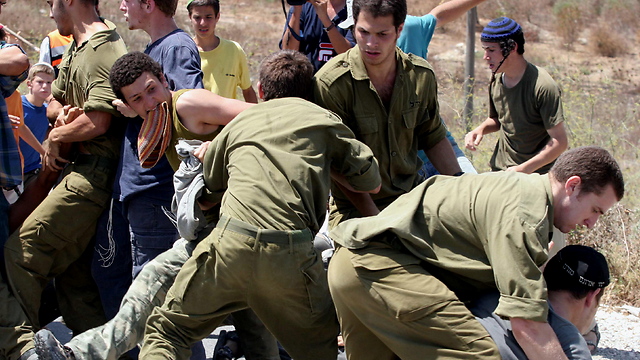Member of Knesset Betzalel Smotrich (Yamina) and Coalition Chairman Miki Zohar (Likud) introduced legislation this week to repeal the 2005 Disengagement Law from northern Samaria “to correct the injustice.”
In 2005, under heavy pressure from United States President George W. Bush and Secretary of State Condoleezza Rice, Prime Minister Ariel Sharon (Likud) surrendered the Gaza region and destroyed all 21 of its Jewish communities.
In addition, Bush demanded that four small Jewish villages in northern Samaria also be destroyed in order to dispel the notion that Israel would relinquish Gaza but retain the West Bank.
The four villages – Ganim, Kadim, Sa-Nur and Ḥomesh – were demolished and Israeli civilians were legally banned from visiting their remains but the area remained under full Israeli control.
The bill, which seeks to repeal the section in the Disengagement Law that restricts freedom of movement for Israelis in parts of northern Samaria, was originally conceived by Samaria Regional Council Chief Yossi Dagan. It’s already been brought to Knesset more than once, but had been reportedly rejected each time at the behest of Prime Minister Binyamin Netanyahu (Likud).
But this time around, Dagan is hopeful that the coalition chairman’s support will enable the legislation to be passed into law.
“Not a day or night goes by that I don’t feel pained by the expulsion,” said Dagan, who was himself expelled from the community of Sa-Nur.
“The expulsion was a crime, and the Disengagement Law is a ‘Mark of Cain’ in the law books of the State of Israel.”
Dagan further called on Prime Minister Netanyahu to endorse the bill.
MK Zohar, meanwhile, spoke about the need to correct the state of injustice perpetrated by Sharon.
“We need to end this terrible decree against these great people who are dedicated to the Land of Israel,” said Zohar.
“When I was chosen as coalition chairman, I dedicated myself – and obligated myself – to the cause of the Land of Israel. I won’t compromise and I will struggle against anyone I need to in order to make the changes our holy land deserves. Therefore, passing this bill is one of my most important priorities, and we’ll do everything we can to complete the process.”
MK Smotrich, who himself lives in the Samaria region, added that 15 years after “the horrible folly of the expulsion from Gush Katif and northern Samaria and the destruction of these wonderful parts of the country, it is time to correct the mistake.”
Under normal circumstances, such a law would be difficult to pass, as it would reverse the policy trajectory forced on Israel by the United States.
Reports of Netanyahu blocking the bill in the past are not likely due to personal ideological opposition but rather an unwillingness to be pushed into conflict with Washington. Successive US administrations have worked hard to force territorial concessions on Israel and no American president wants to see Jerusalem discard commitments made to his predecessor.
But given Zohar’s enthusiasm, Netanyahu’s current political weakness and the domestic challenges confronting the US administration, the likelihood of Dagan’s bill passing is higher now than ever before. Given the catastrophic legacy of the Disengagement policy and the irrelevancy of this legislation to Palestinian issues, it would be hard for any lawmakers to oppose it on moral grounds.
But preparation must be made for the day after the bill passes into law. Cadres of activists, not only teenagers but also families, must be prepared to return to Ganim, Kadim, Sa-Nur and Ḥomesh in order to rebuild and populate the villages demolished 15 years ago by Sharon.
Under normal circumstances, a prime minister would likely send security forces to prevent such an initiative. But the likelihood of another national election looming also means Netanyahu will be sensitive to the feelings of his Likud party’s nationalist base, and might therefore hesitate to use force if the Jews involved show sufficient resolve and make it clear they won’t go quietly.
The time may not be right to return to Gaza and rebuild Gush Katif. For that, more Israelis – especially those committed to Eretz Yisrael – will require a paradigm shift when it comes to the Palestinian question. But a real opportunity might currently exist to begin the process of reversing the criminal Disengagement policy by restoring what was lost in northern Samaria.





